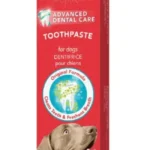It’s crucial to feed your pregnant dog a balanced, raw diet, but knowing what constitutes high-quality dog food can be challenging. Here is our guide on the best raw food for pregnant dogs, what foods to avoid, and answers to questions you may have.
Is Raw Food Good For Pregnant Dogs?
Yes, raw food can be particularly beneficial for pregnant dogs. A well-rounded raw diet, rich in protein, vitamins, and minerals, can support the development of puppies and maintain the mother’s health. It provides natural enzymes and antioxidants often lost in commercial, processed diets. But it’s essential to ensure the raw diet is correctly balanced, safe, and clean to prevent potential health risks. Always consult a professional or a vet to create the most beneficial diet for your pregnant dog.
Should You Give Raw Food to Pregnant Dogs?
Absolutely. As previously mentioned, raw food diets can offer numerous benefits to pregnant dogs, but it is critical to approach this correctly. Not all raw foods are created equal. Therefore, certain types of food are due to potential health risks.
Before venturing into a raw food diet for your pregnant dog, it is best to consult with a veterinarian or a canine nutritionist. They can guide the proper balance of nutrients necessary for the mother and her developing puppies and instruct you on safe handling and preparation methods to prevent bacterial contamination. Educating yourself thoroughly on the intricacies of a raw food diet will ensure your pregnant dog receives the best possible nutrition.
The Importance of a Balanced Raw Diet
A balanced raw diet is essential for a pregnant bitch. It provides the necessary nutrients for the mother and boosts the puppies’ immune system. According to Dr Ian Billinghurst, a raw diet can help the pregnant bitch produce high-quality milk and provide the puppies with the essential nutrients they need.
- High-Quality Ingredients for a Raw Diet
Chicken wings and organ meats are excellent sources of protein and fat, essential for the growth and development of puppies. The fat content in these foods is crucial for milk production in the pregnant bitch. However, remember to increase the amount gradually to avoid any digestive issues.
Raw egg, specifically egg yolks, is another high-quality ingredient you can add to the diet. Egg yolks are rich in essential fatty acids and boost extra protein. However, beware of the myth that raw egg whites can lead to a biotin deficiency.
- Essential Supplements for a Pregnant Dog
Supplements, calcium, and essential fatty acids play a significant role in the development of puppies. They strengthen the puppies’ immune system and contribute to the mother’s overall health.
- Dealing with Morning Sickness
Just like humans, dogs can also experience morning sickness during pregnancy. If your dog seems to stop eating altogether due to nausea, try changing her feeding schedule and portion size.
By following these guidelines, you can ensure your pregnant bitch gets the nutrition she needs. Always consult your vet before making significant changes to your dog’s diet. With a balanced raw diet, your pregnant dog can deliver healthy puppies and maintain her health during this critical time. Let’s give our furry mothers the best possible care they deserve!
With the right nutrition, your dog can have a healthy pregnancy and deliver strong and healthy puppies. So, let’s give our furry mothers the best care they deserve!
Examples of Raw Foods Beneficial for Pregnant Dogs
Various raw foods are highly beneficial for pregnant dogs. Here are some examples:
- Organ Meats: These include liver, kidney, and heart from animals like chicken, turkey, and beef. They are rich in essential vitamins and minerals.
- Muscle Meats: Muscle meats such as beef, lamb, chicken, and turkey are excellent protein sources.
- Dairy: Raw, unprocessed dairy products such as yogurt and kefir can provide healthy probiotics.
- Fish: Oily fish like sardines and salmon are rich in omega-3 fatty acids, which are beneficial for developing puppies’ brains and eyes.
- Eggs: Eggs are a nutritional powerhouse, providing high-quality protein and essential fatty acids.
- Fruits and Vegetables: Fruits and veggies such as apples, blueberries, carrots, and spinach can provide fiber, antioxidants, and essential nutrients.
Remember, variety is crucial in a raw food diet, and rotating between different types of meats and vegetables will ensure your pregnant dog gets a wide range of nutrients. Always consult a vet or a professional for tailored advice on feeding your pregnant dog a raw food diet.
Beneficial Vegetables for Pregnant Dogs
Certain vegetables are particularly beneficial for pregnant dogs due to their rich nutrient content. Here are some examples:
- Sweet Potatoes: These are a great source of dietary fiber, vitamin A, and other essential nutrients that benefit the mother dog’s overall health and her pup’s development.
- Carrots: Carrots provide an excellent source of beta-carotene, which the body converts into vitamin A. They also contain fiber, which aids in digestion.
- Broccoli: This vegetable contains vitamins K and C, potassium, and fiber. It also contains bioflavonoids, which have antioxidant effects.
- Spinach: Spinach is rich in vitamins A, C, K, and iron. It’s also an excellent source of antioxidants that help boost the immune system.
- Pumpkin: Pumpkin is rich in fiber and provides a good source of vitamin A, making it an excellent addition to a pregnant dog’s diet.
- Peas: Peas are high in vitamins A, K, and B vitamins. They also have a decent amount of protein for a vegetable.
- Zucchini: Zucchini is a good source of fiber, which aids in digestion. It also contains vitamin C, potassium, and magnesium.
Before adding these vegetables to your pregnant dog’s diet, chop them into small, digestible pieces and cook them to enhance their digestibility. Also, remember that vegetables should be a part of a balanced diet and not replace proteins or other essential food groups. Always consult a vet or a professional before making significant dietary changes for your pregnant dog.
Can I Feed My Pregnant Dog Raw Eggs?
Raw eggs can be a healthy addition to your pregnant dog’s diet. They are a rich source of protein and contain essential fatty acids that are beneficial for the development of puppies. Specifically, egg yolks can be incredibly nutritious.
However, it’s important to note that there’s a common myth about raw egg whites leading to a biotin deficiency. The risk is minimal, especially when the diet is balanced with other nutrient-rich foods. Always consult a veterinarian or canine nutritionist for personalized advice on feeding raw eggs to your pregnant dog.
While the fear of biotin deficiency from raw egg whites is widespread, studies have shown that this risk is minimal when the diet is balanced with other nutrient-rich foods. According to an article published in the American Journal of Clinical Nutrition, the consumption of raw egg whites does not significantly affect biotin status in humans as long as a variety of other nutritious foods are included in the diet. This research also applies to dogs, reinforcing the importance of a diverse and balanced diet. However, it’s always essential to consult a veterinarian before incorporating raw eggs into your pregnant dog’s feeding regimen.
Foods Pregnant Dogs Should Avoid
While a raw diet can be highly beneficial, there are several foods that pregnant dogs should avoid to ensure their health and the health of their puppies. These include:
- Xylitol: This sugar substitute in many sugar-free products can lead to liver failure and hypoglycemia in dogs.
- Onions and Garlic: In large amounts, these can cause anemia by damaging a dog’s red blood cells.
- Raw Fish: Although some cooked fish can be beneficial, raw fish may contain parasites and bacteria that can harm the dog and her puppies.
- Grapes and Raisins: These can cause kidney failure in dogs.
- Chocolate, Coffee, and Caffeine: All contain methylxanthines, which can cause various health problems in dogs, including rapid breathing, abnormal heart rhythm, and death.
- Alcohol: Alcohol can cause significant neurological problems in dogs.
Always consult your vet before making significant changes to your dog’s diet. The health of the mother dog and her puppies is paramount, and any food choice should be made with their well-being in mind.
Tips for Feeding a Pregnant Dog That Won’t Eat
If your pregnant dog doesn’t feel like eating, it might be due to various factors such as stress, changes in her body, or morning sickness. Here are some suggestions on what you can feed her:
- Broth: Chicken or beef broth can be appetizing and may encourage her to eat. Make sure it’s low-sodium and doesn’t contain onion or garlic.
- Rice: Cooked white rice is gentle on their stomach and might be accepted more readily.
- Poultry: Boiled chicken or turkey can be a good source of lean protein.
- Pumpkin: A small amount of cooked, pureed pumpkin can help soothe her stomach.
- Probiotics or Digestive Enzymes can help calm her stomach and increase appetite. Always consult with your vet before adding these to her diet.
If your dog refuses to eat for an extended period, consult your vet immediately, as it could indicate a more severe problem. Your vet can offer guidance and possible treatments to stimulate her appetite. While ensuring a balanced, nutrient-rich diet for your pregnant dog, here are some things to avoid to ensure her health and that of her puppies.
- Poor Quality Food: Low-quality dog foods often lack the necessary nutrients and could contain harmful fillers or by-products. Always opt for high-quality, nutritionally balanced dog food.
- Overfeeding: While pregnant dogs require more calories, overfeeding can lead to obesity and associated health issues. Monitor her weight and consult your vet to determine the appropriate amount of food.
- Certain Medications: Some medications can harm the unborn puppies or interfere with pregnancy. Always discuss any medications with your vet before administering them to your pregnant dog.
- Rawhide Bones: These can pose a choking risk and carry bacteria.
- Large Amounts of Liver: While the liver is nutritious, large amounts can lead to Vitamin A toxicity.
- Diet Changes: Sudden changes in diet can cause digestive upset. Therefore, if you want to make any dietary changes, make them gradually.
Regular veterinary check-ups are crucial throughout your dog’s pregnancy to monitor her health and the development of her puppies. Always seek professional advice before significantly changing your pregnant dog’s diet or routine.
Is Liver and Raw Chicken Good for a Pregnant Dog?
Liver and raw chicken can be beneficial components of a pregnant dog’s diet when provided in appropriate amounts and prepared correctly. The liver is a nutrient-dense food packed with essential vitamins like A, D, E, and K and vital minerals like iron. However, it’s important to note that excessive liver consumption can lead to Vitamin A toxicity in dogs. So, feed liver to your dog in moderation.
On the other hand, raw chicken can offer a high-quality source of protein, which is crucial for a pregnant dog’s physical health and the proper development of her puppies. However, handling and preparing raw chicken properly is paramount to prevent any risk of bacterial contamination, such as Salmonellosis. Some vets recommend cooking the chicken to eliminate the risk of bacteria. You can try rotisserie chicken for your dog.
As with all dietary considerations, it is advisable to consult your vet before incorporating these foods into your pregnant dog’s diet. They can provide personalized advice based on your dog’s specific nutritional needs and overall health.
Boosting Milk Production in Pregnant Dogs
To help a pregnant dog with milk production, she must consume a diet high in protein, fat, and certain key nutrients. Here are some food recommendations:
- High-Quality Dog Food: Purchase high-quality dog food for pregnant and nursing dogs. These foods typically contain higher protein and fat content to support milk production.
- Cottage Cheese: Some vets recommend adding cottage cheese to your dog’s diet during the last week of pregnancy and lactation. It provides extra calcium, which is crucial for milk production.
- Fenugreek: Fenugreek is an herbal supplement that enhances milk production in some animals. Always consult a vet before adding herbal supplements to your dog’s diet.
- Protein-rich Foods: Feeding your dog extra protein during pregnancy and lactation can help with milk production. This could include lean meats, eggs, and fish.
- Fresh Water: Always ensure your pregnant dog has access to plenty of fresh water. Dehydration can inhibit milk production.
It’s important to remember that every dog is unique, and what works for one might not work for another. Always consult your vet before changing your dog’s diet, especially during pregnancy and lactation. They can provide guidance based on your dog’s specific needs and overall health.





